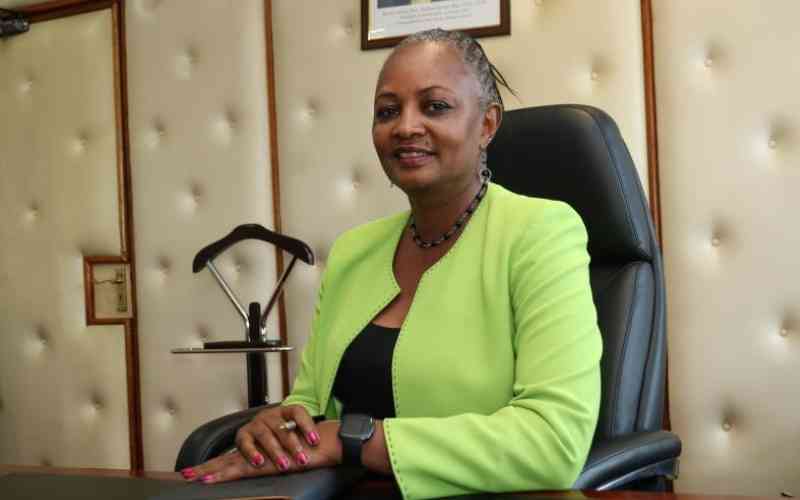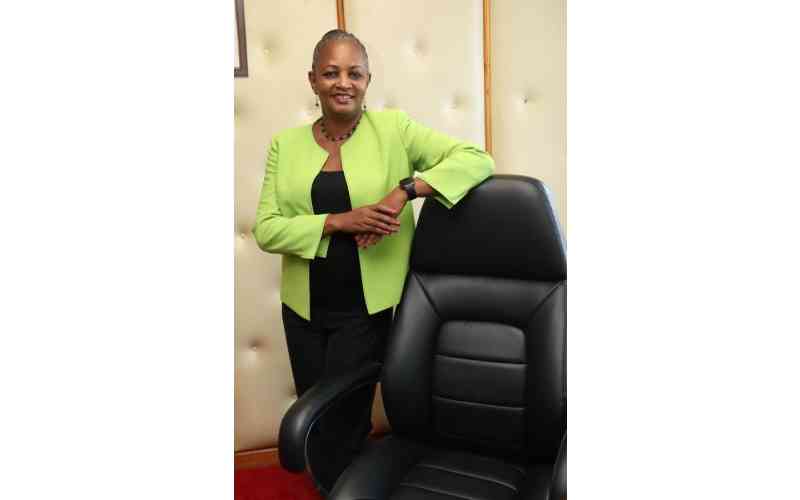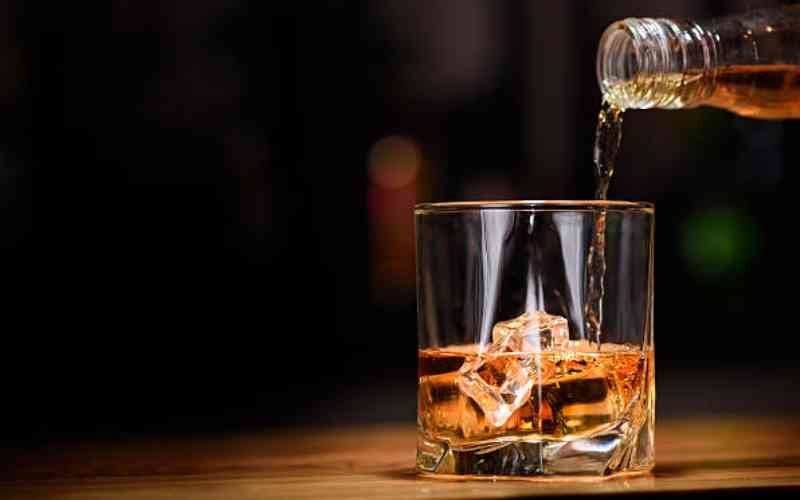
The former Miss Kenya runner-up had just been thrown out of the church while trying to get born again. She was seeking salvation because she was tired of the life she had been living.
People had been avoiding her, calling her names and her self-esteem was in the dustbin. She had thought church was her remaining solace, but she had a habit of insulting them every time she passed by when drunk. So when she got tired of her life as a raging alcoholic and went there seeking salvation, they wanted nothing to do with her.
"When they threw me out, I sat on a rock and cried," Ann Mathu says. "I had been admitted to the hospital quite several times and the moment I was discharged I would put the medication in a tin instead of taking it."
The church turning its back on her was the last straw and she felt that the only option she had left then was suicide. So she bought half a litre of chang'aa and took all the medication she had been keeping. Her brother found her unconscious and took her to the hospital.
When her mother found out, she told the entire family that Ann had attempted suicide.
"When they came to hospital, one of the first questions one of my relatives asked me was, 'Ulikuwa unataka kukufa uende wapi na umekataliwa mpaka na shetani?'" she says.
"So you can imagine you have just been thrown out of the church and someone tells you that even Satan cannot accommodate you, that 'utaenda kuharibu watu wake huko' (you will go and corrupt his people there)' So where do you stand? Who are you? Who is Ann Mathu now? Not in heaven, not in hell. Nobody wants to see you. Everybody else is calling you names."
Upon discharge, she attempted suicide two more times and her brother saved her every time. It was not until one person saw the potential in her and saved her life, this time for good.
Ann was introduced to alcohol and cigarettes by her father at the age of 10. Her father was a functioning alcoholic and was the senior administration officer at Thika Municipal Council then and he would take her with him on his drinking sprees on weekends.
"He would drink till the wee hours of the morning, take a shower and go to work. He died in a road accident in 1977," she says.
She joined Ngandu Girls (Bishop Gatimu Ngandu Girls High School today) the same year he died.
"I was a daddy's girl and his death left me a very empty person. It shattered me because my dad was everything to me so now that he was out of the picture out of my life, it was devastating," she says.
Ann was not close to her mother because she was a strict disciplinarian, while her father was more easygoing, with a hands-off parenting style.
"After he was buried, I was not given time to mourn him and had to go back to school immediately. I tend to believe that is where I started becoming rebellious because I did not know how to cope with the death," she says.
"And you know, school is all about discipline, authority and all that. So I became a rebellious girl who wanted to do everything differently and to stand out in anything that gave me give me attention, most of it negative."
She started sneaking alcohol into school, and she says it got worse when Kenya's first president, Jomo Kenyatta, died the next year in 1978, and senior government officials took their children out of schools in Nairobi and took them to upcountry schools.

"Most of those children from high-end families used to bring alcohol and cigarettes to school, so I had a lot of supply. It affected my education negatively and I got a 3rd Division in my exam," she says.
That was unheard of at that school at the time, as the school was known for having a 100 per cent transition from secondary school to high school, so she and her friends were among the first to get a 3rd Division in the school.
"It was a disappointment not only to me and the school but also to my family because a 3rd Division meant I could not go to forms 5 and 6. So I became frustrated because everybody started closing in on me for being a failure," she says.
Ann joined Kenya Polytechnic for a diploma in Institutional Management, which was about catering and housekeeping.
"We used to get a boom of Sh500, which was a lot of money for me. Beer used to go for 3 shillings and 50 cents. So you can imagine 500 shillings? It was a lot of money, so my drinking did not become any better. I joined a group of girls who were drinking and smoking. We used to go out to discos and we had the money, did not depend on anybody to provide for us," she says.
Once again, that took a toll on her education in college. That was in 1981.
She participated in Miss Kenya in 1982 and came second. The title brought with it more monied friends, more clubbing and drinking, and more misfortune.
"I got pregnant and my boyfriend abandoned me. Even after failing the exams after college, I had to work for the government for three years because I was a government-sponsored student," she says.
She was posted to Moi Equator Girls in Eldoret, where she got her first baby. As a new, abandoned and disappointed mother, she became a closet drinker and eventually fell out with the management due to her drinking.
On transfer to Kericho Tea Hotel, she got into a bad relationship, her drinking got even worse, she got pregnant again and the man also abandoned her.
"So it was just loss after loss, disappointment after disappointment. But that time, I did not attribute these disappointments and failures to my drinking. I thought everybody else was to blame apart from me and my drinking," she says.
Eventually, she went back to Makongeni in Thika, where her brother, who was also an alcoholic, told her to make sure that the place she rented was near a bar.
It was in Thika where she met a doctor, also an alcoholic, and she and her children moved in with him. He woke up one morning five years later, vomiting blood and was pronounced dead on arrival at the hospital.
"The family blamed me for his death so I was not allowed to bury him. I was not even allowed to view the body on the day of the burial, his family chased me away at the mortuary. So that was another major loss that I never processed," she says.
After his death, her mum took her now three children and she went to live with a family friend in Thika, then took second-generation alcoholic drinks because she could not afford anything else.
"The doctor's relatives took everything away from us. They only left us with the clothes we wore on the burial date so I went back with nothing. There were so many things that were happening to me and the only solace I could get was in alcohol drinking," she says.
A friend living in Germany was shocked to see her living in the state she was in, malnourished, and took her back to Germany in the hope that a different environment would help, but she had underestimated the kind of hold that alcohol had on Ann and they ended up falling out.
A 72-year-old white German male, also an alcoholic that she met in a bar was smitten by her and she convinced him to come back to Kenya where they got married.
He wanted to adopt her children so he went back to Germany to work on the necessary papers, but being very frail healthwise due to alcohol, he ended up dying before he could return.
"Since I was not married according to the law, that is how I lost everything. And now with no money coming in, the little I had, I sold. I sold my wedding ring and my engagement ring. I sold my wedding dress, I sold everything, went back to second-generation alcoholic drinks, and then drifted to drinking chang'aa," she says.
She moved to Kiandutu slums, where her only possession was a very thin mattress. She had exchanged even the door lock for a glass of chang'aa.
She was in such a bad state that she could not even stand, without taking it, and if her brother, also an alcoholic, did not bring her the half-litre of chang'aa, she would just lie there, vomiting on herself and all, physically unable to get up. She was also constantly in and out of hospital due to severe withdrawals.

She and her brother would pickpocket to sustain the habit. The church incident and three suicide attempts later, her turnaround came when she blacked out at 10 am one day, having been given jet fuel by her brother due to chang'aa being unavailable and only regaining consciousness the next day.
An old friend with whom they had been drinking when she worked at Panafric came looking for her and told her about rehabilitation.
"That is the person who brought out the good in me. He told me, 'Ann, you are still very beautiful, you are still very intelligent and you can still make a difference in this nation.'," she says.
"He told me about his journey in rehab, how he came out straight as an addiction counsellor and was then working in a treatment facility. That is the man who gave me hope. That is the only person who saw the good in me when everyone else saw the bad. This is the guy who revived me. Who gave me life. That is how I ended up going to Asumbi treatment centre in Homa Bay."
When she completed the 90-day programme, she worked as a volunteer for six months, then did a training that was sponsored by the Volunteer Service Offices (VSO), which trained former addicts to become addiction counsellors.
She then worked for Asumbi from 2006 to 2008 as an addiction counsellor, then for Nacada from 2008 to 2010, after they saw her story in the newspaper.
"In 2010 I resigned and founded a programme called Sober Again Outreach programme, which reaches out to alcoholics and drug addicts. I also wrote a book titled Sober Again about my life in addiction," she says.
She was then appointed as a board member of Nacada in late February 2023, and then elected as vice chair of the board on International Women's Day.
Her journey to this point, now 18 years of uninterrupted sobriety, has been a result of following everything recommended in the support groups she is in.
She advises anyone struggling with addiction to join them, and the Nacada site has several recommendations for this in addition to offering counselling over the phone.
What became of the man who saved her life? Well, they are still in touch and he just celebrated his 22nd year in sobriety and was one of the first people to congratulate her when she was appointed as director and then vice chair of the Nacada board.
"He is proud of me. And he will always tell me when he is celebrating every sobriety year. So at times, we meet for lunch. When we have family gatherings at home we also invite him and his family," she says.
Showing an addict their good side, when no one else can see it anymore, might be the thing that makes all the difference in their lives, while also seeking professional help for them. Ann also advises seeking therapy for yourself and joining support groups yourself if your loved one is an addict.
 The Standard Group Plc is a multi-media organization with investments in media
platforms spanning newspaper print
operations, television, radio broadcasting, digital and online services. The
Standard Group is recognized as a
leading multi-media house in Kenya with a key influence in matters of national and
international interest.
The Standard Group Plc is a multi-media organization with investments in media
platforms spanning newspaper print
operations, television, radio broadcasting, digital and online services. The
Standard Group is recognized as a
leading multi-media house in Kenya with a key influence in matters of national and
international interest.
